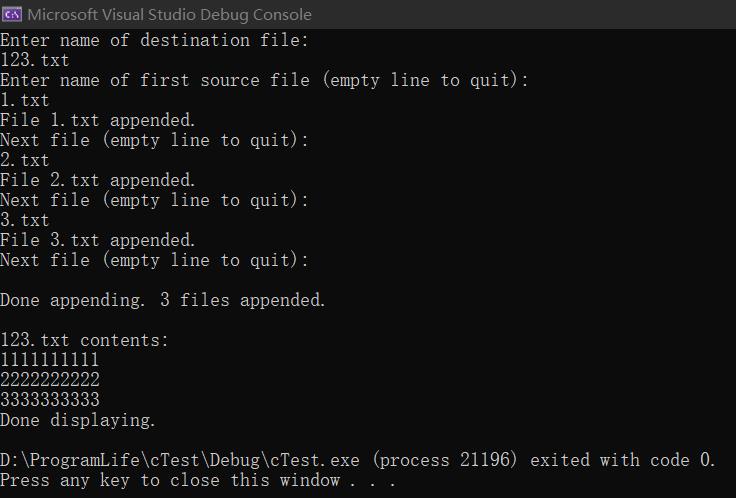[I/O]将多个源文件中的内容追加保存一个目标文件末尾
Posted Spring-_-Bear
tags:
篇首语:本文由小常识网(cha138.com)小编为大家整理,主要介绍了[I/O]将多个源文件中的内容追加保存一个目标文件末尾相关的知识,希望对你有一定的参考价值。
本程序实现把一系列文件中的内容附加在另一个文件的末尾。
程序的设计方案:
- 询问目标文件的名称并打开它
- 使用一个循环询问源文件
- 以只读方式依次打开每个源文件,并将其添加到目标文件的末尾
细化程序打开文件的步骤:
- 以附加模式打开目标文件
- 如果打开失败,则退出程序
- 为该文件创建一个4096字节的缓冲区
- 如果创建失败,则退出程序
细化文件拷贝步骤:
- 如果该文件与目标文件相同,则跳至下一个文件
- 如果以只读模式无法打开文件,则跳至下一个文件
- 把文件内容添加至目标文件末尾
最后,程序回到目标文件的开始处,显示当前目标文件的所有内容。
源文件有三个文件:1.txt、2.txt、3.txt ;目标文件名为123.txt
1.txt中的内容共有两行:第一行有十个数字1,第二行包含一个换行符;
2.txt中的内容共有两行:第一行有十个数字2,第二行包含一个换行符;
3.txt中的内容共有一行:内容为十个数字3
- 运行示例:

- 源码:
/* 把一系列源文件中的内容追加保存到一个目标文件 */
#include<stdio.h>
#include<stdlib.h>
#include<string.h>
#define BUFSIZE 4096 // 缓冲区大小
#define SLEN 81 // 数组最大长度
/* 将source文件中的内容追加保存到dest文件中 */
void append(FILE* source, FILE* dest);
/* 创建一个字符串st,串中可有空白 */
char* s_gets(char* st, int n);
int main(void)
{
FILE* fa, * fs; // fa指向目标文件,fs指向源文件
int files = 0; // 附加的文件数量
char file_app[SLEN]; // 目标文件名
char file_src[SLEN]; // 源文件名
int ch;
/* 输入目标文件名 */
puts("Enter name of destination file:");
s_gets(file_app, SLEN);
/* 目标文件打开(创建)失败 */
if ((fa = fopen(file_app, "a+")) == NULL)
{
fprintf(stderr, "Can't open %s\\n", file_app);
exit(EXIT_FAILURE);
}
/* 为fa文件创建一个4096字节的缓冲区 */
if (setvbuf(fa, NULL, _IOFBF, BUFSIZE) != 0)
{
fputs("Can't create output buffer\\n", stderr);
exit(EXIT_FAILURE);
}
/* 输入源文件名,键入空结束 */
puts("Enter name of first source file (empty line to quit):");
/* 输入源文件名且不为空 */
while (s_gets(file_src, SLEN) && file_src[0] != '\\0')
{
if (strcmp(file_src, file_app) == 0) // 源文件不可与目标文件相同
{
fputs("Cant't append file to itself\\n", stderr);
}
else if ((fs = fopen(file_src, "r")) == NULL) // 以只读模式打开源文件失败
{
fprintf(stderr, "Can't open %s\\n", file_src);
}
else
{
if (setvbuf(fs, NULL, _IOFBF, BUFSIZE) != 0) // 创建输入缓冲区
{
fputs("Can't create input buffer\\n", stderr);
continue;
}
/* 将文件fs中的内容追加到fa文件末尾 */
append(fs, fa);
/* 读源文件时出错 */
if (ferror(fs) != 0)
{
fprintf(stderr, "Error in readiing file %s.\\n", file_src);
}
/* 内容写进目标文件时出错 */
if(ferror(fa) != 0)
{
fprintf(stderr, "Error in writing file %s.\\n", file_app);
}
/* 关闭源文件 */
fclose(fs);
files++;
/* 当前文件追加保存成功 */
printf("File %s appended.\\n", file_src);
puts("Next file (empty line to quit):");
}
}
/* 文件追加保存成功提示 */
printf("Done appending. %d files appended.\\n\\n", files);
/* 回到目标文件开头 */
rewind(fa);
/* 打印目标文件中的内容 */
printf("%s contents:\\n", file_app);
while ((ch = getc(fa)) != EOF)
{
putchar(ch);
}
puts("\\nDone displaying.");
/* 关闭目标文件 */
fclose(fa);
return 0;
}
/* 将source文件中的内容追加保存到dest文件中 */
void append(FILE* source, FILE* dest)
{
size_t bytes;
/* 静态存储期,块作用域 */
static char temp[BUFSIZE];
/* 使用fread()和fwrite()一次拷贝4096字节,而不是1字节 */
while ((bytes = fread(temp, sizeof(char), BUFSIZE, source)) > 0)
{
fwrite(temp, sizeof(char), bytes, dest);
}
}
/* 创建一个字符串st,串中可有空白 */
char* s_gets(char* st, int n)
{
char* ret_val;
char* find;
ret_val = fgets(st, n, stdin);
if (ret_val)
{
/* 在st字符串中查找'\\n' */
find = strchr(st, '\\n');
/* 替换掉字符串中的换行符 */
if (find)
{
*find = '\\0';
}
else
{
while (getchar() != '\\n')
{
continue;
}
}
}
return ret_val;
}
以上是关于[I/O]将多个源文件中的内容追加保存一个目标文件末尾的主要内容,如果未能解决你的问题,请参考以下文章